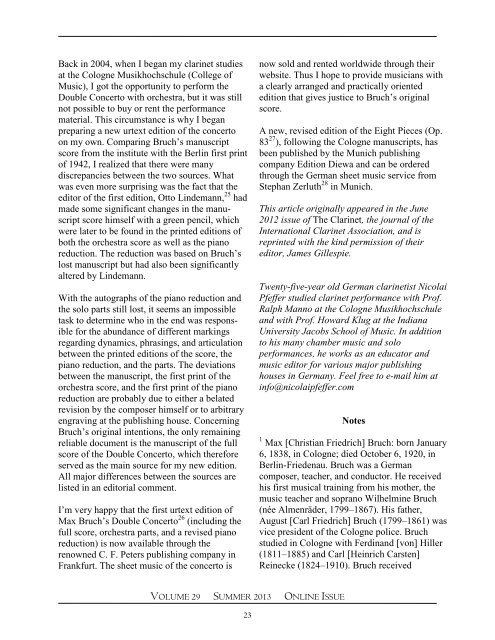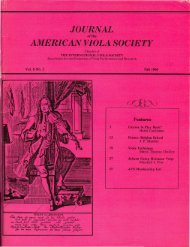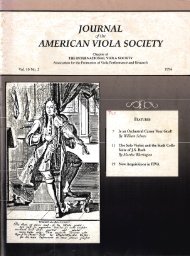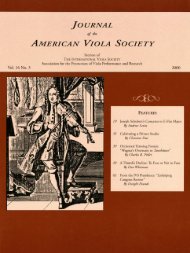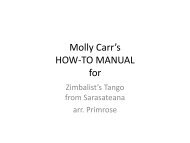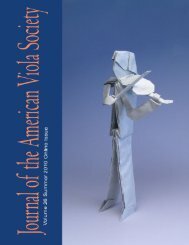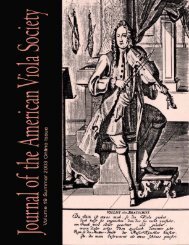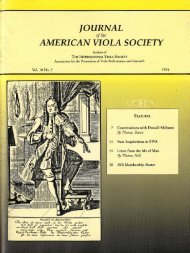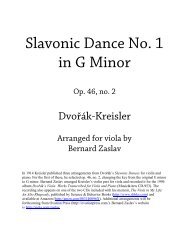Summer 2013 - The American Viola Society
Summer 2013 - The American Viola Society
Summer 2013 - The American Viola Society
Create successful ePaper yourself
Turn your PDF publications into a flip-book with our unique Google optimized e-Paper software.
Back in 2004, when I began my clarinet studies<br />
at the Cologne Musikhochschule (College of<br />
Music), I got the opportunity to perform the<br />
Double Concerto with orchestra, but it was still<br />
not possible to buy or rent the performance<br />
material. This circumstance is why I began<br />
preparing a new urtext edition of the concerto<br />
on my own. Comparing Bruch’s manuscript<br />
score from the institute with the Berlin first print<br />
of 1942, I realized that there were many<br />
discrepancies between the two sources. What<br />
was even more surprising was the fact that the<br />
editor of the first edition, Otto Lindemann, 25 had<br />
made some significant changes in the manuscript<br />
score himself with a green pencil, which<br />
were later to be found in the printed editions of<br />
both the orchestra score as well as the piano<br />
reduction. <strong>The</strong> reduction was based on Bruch’s<br />
lost manuscript but had also been significantly<br />
altered by Lindemann.<br />
With the autographs of the piano reduction and<br />
the solo parts still lost, it seems an impossible<br />
task to determine who in the end was responsible<br />
for the abundance of different markings<br />
regarding dynamics, phrasings, and articulation<br />
between the printed editions of the score, the<br />
piano reduction, and the parts. <strong>The</strong> deviations<br />
between the manuscript, the first print of the<br />
orchestra score, and the first print of the piano<br />
reduction are probably due to either a belated<br />
revision by the composer himself or to arbitrary<br />
engraving at the publishing house. Concerning<br />
Bruch’s original intentions, the only remaining<br />
reliable document is the manuscript of the full<br />
score of the Double Concerto, which therefore<br />
served as the main source for my new edition.<br />
All major differences between the sources are<br />
listed in an editorial comment.<br />
I’m very happy that the first urtext edition of<br />
Max Bruch’s Double Concerto 26 (including the<br />
full score, orchestra parts, and a revised piano<br />
reduction) is now available through the<br />
renowned C. F. Peters publishing company in<br />
Frankfurt. <strong>The</strong> sheet music of the concerto is<br />
now sold and rented worldwide through their<br />
website. Thus I hope to provide musicians with<br />
a clearly arranged and practically oriented<br />
edition that gives justice to Bruch’s original<br />
score.<br />
A new, revised edition of the Eight Pieces (Op.<br />
83 27 ), following the Cologne manuscripts, has<br />
been published by the Munich publishing<br />
company Edition Diewa and can be ordered<br />
through the German sheet music service from<br />
Stephan Zerluth 28 in Munich.<br />
This article originally appeared in the June<br />
2012 issue of <strong>The</strong> Clarinet, the journal of the<br />
International Clarinet Association, and is<br />
reprinted with the kind permission of their<br />
editor, James Gillespie.<br />
Twenty-five-year old German clarinetist Nicolai<br />
Pfeffer studied clarinet performance with Prof.<br />
Ralph Manno at the Cologne Musikhochschule<br />
and with Prof. Howard Klug at the Indiana<br />
University Jacobs School of Music. In addition<br />
to his many chamber music and solo<br />
performances, he works as an educator and<br />
music editor for various major publishing<br />
houses in Germany. Feel free to e-mail him at<br />
info@nicolaipfeffer.com<br />
Notes<br />
1 Max [Christian Friedrich] Bruch: born January<br />
6, 1838, in Cologne; died October 6, 1920, in<br />
Berlin-Friedenau. Bruch was a German<br />
composer, teacher, and conductor. He received<br />
his first musical training from his mother, the<br />
music teacher and soprano Wilhelmine Bruch<br />
(née Almenräder, 1799–1867). His father,<br />
August [Carl Friedrich] Bruch (1799–1861) was<br />
vice president of the Cologne police. Bruch<br />
studied in Cologne with Ferdinand [von] Hiller<br />
(1811–1885) and Carl [Heinrich Carsten]<br />
Reinecke (1824–1910). Bruch received<br />
VOLUME 29 SUMMER <strong>2013</strong> ONLINE ISSUE<br />
23


